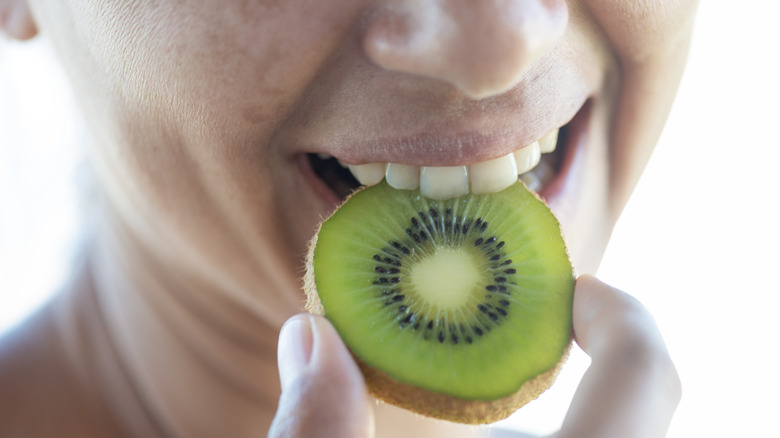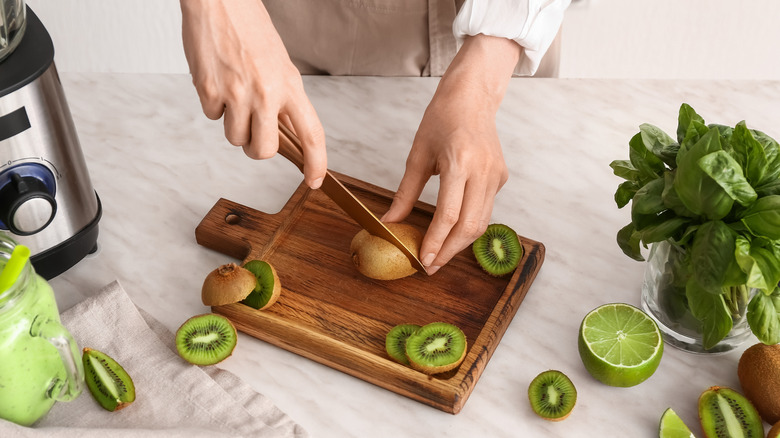The Unexpected Fruit That Can Help Prevent UTIs (And It's Not Cranberries)
It only takes one urinary tract infection (UTI) to convince you that you never want to deal with another. From painful urination and back discomfort to pelvic area cramping, the symptoms of a UTI can keep you down. Plus, having a UTI puts you at a higher risk of going through the experience again. In fact, a 2022 review from GMS Infectious Diseases noted that between 30% and 50% of women who get a UTI will have another one within six months to a year. And all those individual UTIs collectively add up to an estimated $1.6 billion in healthcare costs, making UTIs both a personal and a socioeconomic issue.
Fortunately, you can take steps to prevent your first (or umpteenth) UTI through a variety of measures, including eating foods. For instance, cranberries and cranberry byproducts are popular fruits that may help decrease your risk of UTIs. However, they're not the only selections from the produce aisle that can potentially protect you from a UTI. Kiwi fruit may, too.
Dense in nutrients known to halt bacterial growth
Sometimes covered by a fuzzy peel depending upon the type, kiwis are compact and have a citrus-sweet flavor. Yet it's not their taste that can assist in warding off a nasty UTI — it's their nutritional content.
Kiwis contain high levels of vitamin C (gold kiwis have the most vitamin C at 161.3 milligrams, versus green kiwis at 92.7 milligrams). Additionally, the acid in vitamin C may make it more difficult for unwanted urinary tract bacteria to thrive. Indeed, a 2023 study in BMC Microbiology indicated that when rats with UTIs were given vitamin C, the vitamin C raised their urine acidity to a point that bacteria colonization became difficult. As a result, the authors recommended the use of vitamin C alone or in tandem with antibiotics to reduce antibiotic resistance. (Antibiotic resistance can make it harder to clear up a UTI with prescription medications.)
Kiwis also contain vitamin E, which is a nutrient that, as registered dietitian Gillian Culbertson told the Cleveland Clinic, "boosts your immune system and helps your body fight off infection." And a UTI is, at its core, an infection that can be associated with any number of bacteria (often the E. coli strain).
Eat the whole kiwi to maximize its health benefits
Kiwis contain plenty of antioxidants, too, which may produce anti-inflammatory effects. And though a lot of people tend to throw away the kiwi peel, resist the temptation if you're excited to lower your risk of a UTI. The peel is completely edible. In fact, it's a healthy addition to your diet, according to research.
A 2019 study in Food and Nutrition Research concluded that kiwi peels are brimming with antioxidants and have antibacterial capabilities as well. Consequently, making sure you eat the peels, despite their sometimes unusually fuzzy texture, can amplify the potential health impact of choosing kiwi as a solid ally against the bacteria that cause UTIs to develop and grow.
Beyond eating kiwis and cranberries, you can take other steps to lessen your likelihood of recurrent UTIs. According to the American Medical Association, wiping your pubic area from the front to the back after a bowel movement decreases thespread of bacteria through your genitals. Drinking lots of liquids helps as well.


